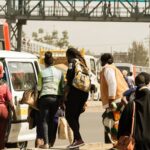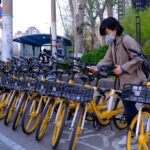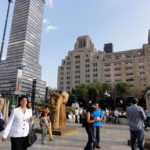Posts tagged with 'Japan'
COP30 in Belém, Brazil, will be the most substantial and strategic mechanism for local and subnational governments to influence and impact national and global sustainability agendas in 2025. As we gear up for the mid-year Bonn Climate Conference, it is ...

For a woman living in an African city, public transport can be a daunting experience. Women usually plan their trips in advance, and consider a multitude of factors before setting out: What is the safest way to reach the bus ...

Public transport is one of the best, most cost-effective solutions available to address today’s climate and development challenges. Buses and trains can reduce greenhouse gas (GHG) emissions by up to two-thirds per passenger, per kilometer compared to private vehicles. The UN’s latest ...

A new digital platform being piloted in cities around the world is making public transportation more efficient, economical and accessible, while encouraging low-carbon travel. Mobility-as-a-Service is an on-demand service that integrates various forms of transportation services into a single platform accessible ...

With recognition of the vital role of both subnational and national governments in the climate agenda, the G7 Roundtable on Subnational Climate Actions was established by the G7 Climate, Energy and Environment Ministers Meeting in 2023 under the presidency of Japan. The ...

Electric vehicle sales have been growing exponentially due to falling costs, improving technology and government support. Globally, 10% of passenger vehicles sold in 2022 were all-electric, according to analysis of data from the International Energy Agency. That’s 10 times more than ...

The conclusion of the Global Stocktake at COP28 in Dubai, United Arab Emirates this December will evaluate how much progress the international Paris Agreement on climate change has made in the fight against the climate crisis and what more is needed to ...

Transportation connects us to one another. It’s how we get to school and work, how we visit our families, and how we access our food and health care. It’s also how we ship goods and deliver services. As economies and ...

For many city leaders, more cars and more highways mean better transportation. And during the current pandemic, fear of COVID-19’s spread is pushing some to turn to private vehicles. But a safe, sustainable transport future does not include further dependence ...

Sexual assault on public transit is all too common. In Bogotá, Colombia, an incredible 37% of female riders of the bus rapid transit system report experiencing unwanted sexual contact while using the system, according to new research, funded in part ...

The Intergovernmental Panel on Climate Change (IPCC) recently released a special report on the social and economic consequences of 1.5 degrees Celsius (2.7 degrees Fahrenheit) of warming compared to 2 degrees Celsius. Changing the temperature in your home by one or two ...

When the March 11, 2011 earthquake in Japan caused a series of energy shortages throughout the country, the national government recommended that office buildings cut back on air conditioning during the summer months in order to reduce power usage. Through ...

Urbanization is reshaping the economy, energy systems, and climate of our planet. By 2050, the world’s cities are expected to add 2.5 billion people who will need housing, hospitals, schools, and places to work. Though global greenhouse gas emissions continue ...

For urban commuters, a safe, convenient place to store their bike can be the difference between choosing to cycle and needing to drive. Even in bicycle-friendly cities, cyclists can still face the challenge of having to lug their bike on ...

Do steep hills prevent you from biking? They don’t have to. The city of Trondheim, Norway, has demonstrated an original way to promote cycling: make uphill biking easy. Called the “Trampe CycloCable,” this 130-meter bike lift pushes cyclists using a ...


























